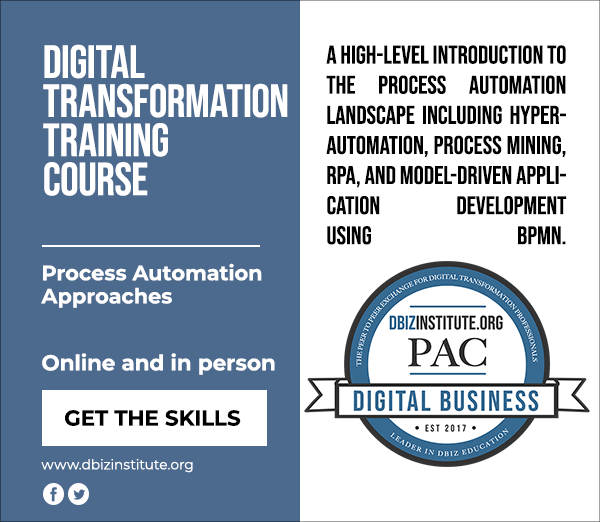Process Automation Approaches: Working with Hyperautomation, Process Mining, RPA, and BPMN Automation – Face-to-Face
$1,195.00
As part of the core Digital Transformation curriculum, this course provides a high-level introduction to the process automation landscape including hyperautomation, process mining, RPA, and model-driven application development using BPMN.
| Course Date | Standard Rate | Buy Before | Your Rate | Savings |
|---|---|---|---|---|
| Apr 16 '25 | $1,195.00 | — | $1,195.00 | $0.00 |
| Jun 11 '25 | $1,195.00 | Apr 12 | $895.00 | -$300.00 |
| Sep 17 '25 | $1,195.00 | Jul 19 | $895.00 | -$300.00 |
| Nov 19 '25 | $1,195.00 | Sep 20 | $895.00 | -$300.00 |
As part of the core Digital Transformation curriculum, this course provides a high-level introduction to the process automation landscape including hyperautomation, process mining, RPA, and model-driven application development using BPMN.
This course distills all of the approaches and technologies available in the industry today down into a one-day course that will get you started quickly. Learn about the new technologies and approaches to streamline many day-to-day processes. Learn how to leverage cloud services and automation to enhance your offerings and customer service. It will help you validate your approach to automation and learn many other techniques and technologies to implement process automation.
This course examines current process automation approaches including Process Mining, Robotic Process Automation (RPA), and BPMN Automation. You will be introduced to the multiple technologies, tools, and platforms of Hyperautomation including Artificial intelligence (AI), Machine Learning (ML), and event-driven software concepts. Hands-on demo tools will include Celonis Process Mining, UiPath RPA, and the Trisotech Digital Enterprise Suite.
The course will define Process Mining, describe its major benefits, examine the vendor landscape, and help you determine where it might fit best in your organization. Several use case/case studies will be presented as well as hands-on exercises. You will also learn about the Robotic Process Automation (RPA) vendor landscape, RPA’s major benefits, where RPA fits best, and see several case studies.
Finally, don’t just build BPMN models, build models that can be automated with the push of a button. We will review significant BPMN automation vendors and learn a methodology for transforming BPMN “documentation” models into automation models using the OMG concept of:
Computational Independent Model (CIM) > Platform Independent Model (PIM) > Platform Specific Model (PSM).
Examples of models at different levels of transformation will be explored as students learn to use BPMN shapes like Data Object and Data Store References, Data Associations, Business Rule Tasks, Service Tasks and Scripting Tasks that take on new importance for connecting and orchestrating modern applications and systems.
Along the way, we also discuss the challenges of automation at scale i.e., scaling these automation engines across systems and geographies for 24/7 operations, failover, and improved performance, improving programming productivity with both IT and citizen-developer staff, rapid prototyping, and minimum viable product (MVP) considerations.
Outline
- Introduction to Process Automation
- The Process Automation Landscape
- Process Mining
- Robotic Process Automation (RPA)
- Model-Driven Programming Using BPMN
- Model Transformation – Computational Independent Model (CIM) > Platform Independent Model (PIM) > Platform Specific Model (PSM)
- The Importance of APIs and Orchestration
- Automation at Scale
- Increasing IT Productivity with BPMN Automation
- Minimum Viable Product (MVP) Development
- Citizen Developers and Model-Driven Programming
- Conclusions and What To Do Next
- Get updated on the current process automation landscape
- Help determine what place Hyperautomation, process mining, RPA, and model-driven programming has in your organization
- Better understand the current “API Forward” development culture
- Delve into “make or buy” considerations for low code application development
- Learn how to build or transform BPMN models with the intention of executing/automating them
- Learn about connecting BPMN models to commercial and in-house systems
- Understand the challenges of scaling model-driven applications
- Get a better understanding of how automating BPMN models affects IT and Citizen Developers
Process automation has become a cornerstone of the digital transformation movement while the process automation vendor landscape continues to evolve. This course looks at Hyperautomation, process mining, RPA and the world-wide standard, BPMN, as a model-driven application development tool. In addition to building new applications, the vast inventory of BPMN models created over the last few decades can be transformed to automated applications that can run at scale for any organization using highly cost-effective low code techniques.
- VP’s
- Business Process Owners, Directors, Managers, Analysts
- Solution Architects
- Product Managers
- Business Architects
- Enterprise Architects
- Digital Transformation Officer
- Web & Mobile Application Developers
- IT Process Professionals
- Citizen Developers
- Industry Principals / Subject Matter Experts
















